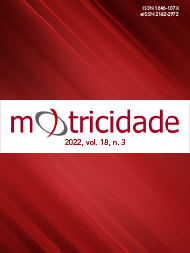O papel do técnico de exercício físico como promotor da qualidade de vida na Dificuldade Intelectual e Desenvolvimental
DOI:
https://doi.org/10.6063/motricidade.26923Palabras clave:
Dificuldade Intelectual e Desenvolvimental, Prescrição, Técnico de exercício físico, Qualidade de vidaResumen
Esta revisão narrativa tem como objetivo examinar as evidências atuais que suportam a importância do exercício físico e o papel do técnico de exercício físico como promotor de educação para a cidadania, da aptidão física e o seu impacto no desempenho das atividades de vida diária e, por conseguinte, da qualidade de vida de indivíduos com Dificuldade Intelectual e Desenvolvimental. Várias questões são elencadas, de modo a perceber as razões para as elevadas taxas de sedentarismo nesta população, o porquê da escassez de estudos experimentais, quem são os intervenientes na avaliação, prescrição e condução dessas atividades, qual a formação dos intervenientes e que cuidados devem ter com a referida população, no qual, através da uma reflexão suportada pela evidência científica, tentar-se-á dar resposta. Em termos de resultados é clara necessidade do mercado de técnicos de exercício físico com formação de base na área das ciências do desporto e específica em atividades físicas adaptadas, no desenrolar de funções, tarefas e atividades com indivíduos com Dificuldade Intelectual e Desenvolvimental, seja em contexto de ensino regular, de fitness ou modalidade desportiva e, consequentemente, promotores de qualidade de vida em indivíduos com Dificuldade Intelectual e Desenvolvimental.
Descargas
Publicado
Número
Sección
Licencia
The authors of submitted manuscripts must transfer the full copyright to Journal Motricidade / Sílabas Didáticas Editions. Granting copyright permission allows the publication and dissemination of the article in printed or electronic formats, and copyrights start at the moment the manuscript is accepted for publication. It also allows Journal Motricidade to use and commercialise the article in terms of licensing, lending or selling its content to indexation/abstracts databases and other entities.
According to the terms of the Creative Commons licence, authors may reproduce a reasonable number of copies for personal or professional purposes, but without any economic gain. SHERPA/RoMEO allows authors to post a final digital copy (post-printing version) of the article on their websites or on their institutions' scientific repository.


